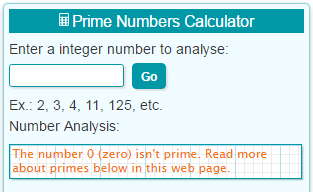Is 100 a prime number?
Here is the answer to questions like: Is 100 a prime number? or is 100 a prime or a composite number?
Prime Numbers Calculator
What is a prime number?
Definition of prime 1
An integer greater than one is called a prime number if its only positive divisors (factors) are one and itself. For example, the only divisors of 11 are 1 and 11, so 11 is a prime number, while the number 51 has divisors 3, 17 and 51 itself (51 = 3•17), making 51 not a prime number.
Definition of prime 2
A positive integer that is not divisible without remainder by any integer except itself and 1, with 1 often excluded.
Note that:
- 0 (zero) is not a prime number because it isn't divided by itself. Zero has an infinite number of divisors (any nonzero whole number divides zero). It cannot be written as a product of two factors, neither of which is itself, so zero is also not composite. More concisely, zero is not a prime or a composite number either.
- 1 (one) is neither a prime nor a composite number. One has only one positive divisor. It cannot be written as a product of two factors, neither of which is itself, so one is also not composite. THe number one falls in a class of numbers called units.
